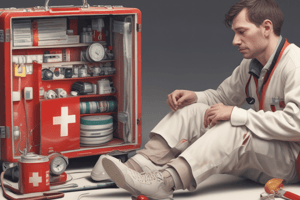Podcast
Questions and Answers
What is the first step in the emergency action steps?
What is the first step in the emergency action steps?
- Provide care
- Assess the victim
- Check the scene (correct)
- Call for help
When should you call for emergency help immediately?
When should you call for emergency help immediately?
- When the person is conscious and alert
- When there are minor injuries
- When someone is unconscious or shows confusion (correct)
- When the scene is crowded
Which of the following is NOT a question to ask when checking the scene?
Which of the following is NOT a question to ask when checking the scene?
- What happened?
- Is anyone else available?
- Is it easy to navigate? (correct)
- What is wrong?
What should you do after calling for emergency help?
What should you do after calling for emergency help?
Which condition requires emergency care according to the guidelines?
Which condition requires emergency care according to the guidelines?
In cardiac emergencies where time is critical, which situation requires you to call first?
In cardiac emergencies where time is critical, which situation requires you to call first?
What is the first action to take when caring for someone who is unconscious and you did not see collapse?
What is the first action to take when caring for someone who is unconscious and you did not see collapse?
Which of the following guidelines is NOT recommended while providing care?
Which of the following guidelines is NOT recommended while providing care?
What should you do first when conducting an interview with an unconscious person?
What should you do first when conducting an interview with an unconscious person?
During a head-to-toe assessment, you should NOT move any areas where there is:
During a head-to-toe assessment, you should NOT move any areas where there is:
Which assessment finding indicates a potential emergency situation?
Which assessment finding indicates a potential emergency situation?
What type of questions should you ask during an interview of a person needing care?
What type of questions should you ask during an interview of a person needing care?
When assessing breathing, which sign suggests a problem?
When assessing breathing, which sign suggests a problem?
Flashcards are hidden until you start studying
Study Notes
Emergency Action Steps
- Three Steps: Check, Call, Care
- Check: Assess the scene for safety, identify any danger for yourself and bystanders, determine what happened, how many people are involved, if anyone else is available to help, and what is wrong with the person
- Call: Call 9999 immediately; it's the most imperative action to save lives.
- Care: Give necessary care until emergency medical services arrive.
Conditions Requiring Emergency Care
- Unconsciousness, Drowsiness, Confusion: Indicates a serious medical issue and requires immediate attention.
- Breathing Problems: Difficulty breathing, wheezing, or gasping for air are crucial signs demanding a call for help.
- Chest Pain: Especially if it radiates to the shoulder, arm, neck, or jaw, suggests potential heart-related problems.
- Persistent Abdominal Pain or Pressure: Persistent pain in the abdomen may indicate a severe medical condition and needs immediate medical attention.
- Severe External Bleeding: Loss of large amounts of blood can be life-threatening and requires immediate medical attention.
- Vomiting Blood or Passing Blood: These symptoms require immediate medical attention as they may indicate internal bleeding.
- Severe Burns: Severe burns can cause serious damage and require prompt medical attention.
- Suspected Poisoning: If anyone has ingested, inhaled, or absorbed a poisonous substance, call for help immediately.
- Stroke: Signs like sudden weakness, numbness, or paralysis on one side of the body, difficulty speaking, or vision problems require an immediate call for emergency services.
- Suspected or Obvious Injuries to Head, Neck, or Spine: This type of injury requires caution and immediate medical attention.
- Painful, Swollen, Deformed Areas (e.g., Fracture): This indicates a possible fracture and necessitates medical attention.
Calling First vs. Caring First
- Call First: Emergency situations where time is critical, including:
- Unconscious adults or children above 12 years old
- A child or infant who you witnessed suddenly collapsing
- An unconscious child or infant known to have heart problems
- Care First: Conditions related to breathing emergencies, such as:
- An unconscious child (under 12 years old) who you did NOT see collapse
- Any drowning victim
Caring For The Injured or Ill
- General Guidelines:
- Do no further harm
- Regularly monitor the individual’s breathing and consciousness
- Help the individual rest in a comfortable position.
- Keep the person from getting chilled or overheated.
- Offer reassurance.
- Provide any specific care required.
Conducting an Interview
- Ask simple questions to learn more about what happened, including the individual's name and details about the event.
- Gather Information: Do they experience pain or discomfort? Do they have any allergies, medical conditions, or medications they take?
- Keep the interview brief.
- Identify yourself and get the person's consent before providing care.
Performing a Head-to-Toe Assessment
- Important Note: Do not move any areas where there's pain or discomfort, or if you suspect a head, neck, or spine injury.
- Head: Check the scalp, face, ears, mouth, and nose for cuts, bruises, bumps, or depressions.
- Consciousness: Observe changes in consciousness, such as alertness, confusion, or drowsiness. Check if the individual is oriented to time, place, and person.
- Skin: Notice how the skin looks and feels (e.g., cool, hot, damp, dry; red, pale, or ashen).
- Breathing: Look for any changes in breathing (e.g., noisy, fast, slow, painful).
- Pulse: Check the radial pulse, as well as capillary refill.
- Body: Ask the person again about areas that hurt.
Studying That Suits You
Use AI to generate personalized quizzes and flashcards to suit your learning preferences.




